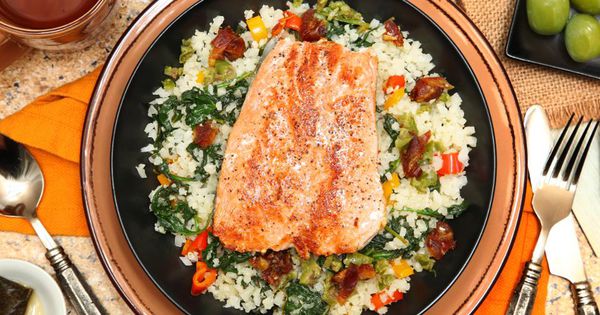
GettyGetty
What should you know about Whole30? originally appeared on Quora: the place to gain and share knowledge, empowering people to learn from others and better understand the world.
Answer by Keck Medicine of USC, 500+ internationally renowned doctors at a leading academic medical center, on Quora:
Everything You Wanted to Know About the Whole30 but Are Too Embarrassed to Ask
You may have heard your coworker raving about it or seen your Facebook friends swap recipes. It seems like everyone is talking about Whole30 these days, but what exactly is it? Read on for the ins and outs.
You know that Whole30 is a diet that took over the interwebs, seemingly overnight. You may even have friends and acquaintances raving about how much energy they have on it and how healthy they feel (or complaining about how much they miss carbs), but what is it exactly? And more importantly, should you try it? Or is it a fad, like juicing? Here are all the details you need to know.
First, a little background: The Whole30 is based on the 2015 book of the same name by Melissa and Dallas Hartwig, both certified sports nutritionists. The duo introduced the program in 2009.
Is it a diet?
At its core, Whole30 is a 30-day elimination diet with no calorie counting. “The Whole30 is about so much more than weight loss, and to focus only on body composition means you’ll overlook all of the other dramatic, lifelong benefits this plan has to offer,” co-founder Melissa writes on the Whole30 website. That’s part of the reason one of the rules of Whole30 is to not weigh yourself and to not take measurements for 30 days.
If it’s not a diet, what is it?
The creators claim that Whole30 is a way to reset your eating habits, your relationship with food and your health. “Eliminate the most common craving-inducing, blood sugar disrupting, gut-damaging, inflammatory food groups for a full 30 days,” Melissa claims. “Let your body heal and recover from whatever effects those foods may be causing.”
What foods are allowed on the program?
Vegetables, potatoes, fruit, meats, seafood, eggs, olive oil, coffee, unsweetened almond and coconut milk, vinegar, salt, spices and seasonings. For a complete list, check out the Whole30 website.
What foods aren’t allowed on the Whole30 program?
Sugar; artificial sweeteners; dairy, including yogurt and cheese; grains of all kinds, including quinoa, oats and bran; beans of all kinds; soy; alcohol; and anything processed (think cookies, chips, fast food).
Do I need to buy any special foods?
No. Your produce doesn’t even have to be organic and your meats don’t have to be grass-fed. But participants say it does require a lot of time and forethought for meal prep to complete the 30 days. That’s why there’s now a Whole30 Cookbook and a large number of Whole30 support groups on Facebook, where members swap recipes.
How much weight can I expect to lose?
Again, Whole30 isn’t focused on weight loss. That said, if you’ve been regularly eating processed foods, you’re more than likely to see the numbers on the scale tick down.
Will I be hungry all the time?
The Whole30 diet doesn’t restrict calories. You can eat as much of the approved foods as you want. That’s not to say you won’t have cravings for certain off-limit foods.
What if I cheat?
If you cheat one time, you’re back at day one and need to start over, regardless if it was on day 2 or day 29, according to the program’s rules.
Do I have to eat like this forever?
Nope. It’s called Whole30 for a reason. There’s a four-step process to reintroducing the off-limits foods into your diet.
Do doctors like the Whole30?
“I think the Whole30 could be a great kickstart to a new lifestyle,” says Jennifer Rose Boozer, DO, clinical assistant professor of family medicine at the Keck School of Medicine of USC and family medicine physician at Keck Medicine of USC’s Glendale and Pasadena locations. “It’s pretty clear-cut and easy to follow, but it’s quite restrictive as to what foods are allowed.”
Whole30 ranked 37 out of 40 in U.S. News & World Report’s ranking of diets in 2018. While almost all medical professionals will agree that cutting out processed foods and artificial sweeteners, limiting your sugar intake and eating more fruits and vegetables is a good thing, there isn’t much evidence to support cutting out whole grains and beans. Moreover, there is evidence that whole grains, including oatmeal, may help you live longer. Other reservations about the diet are that there’s too much meat, too much cholesterol and not enough calcium.
“This is obviously not a great long-term solution, but since it’s only meant for 30 days, it may be a great way to help create new eating habits and reset one’s pallet toward healthier choices,” Dr. Boozer says. “After 30 days, I would recommend adding whole grains and legumes.”
Speak to your physician about which diet is best for you.
This question originally appeared on Quora – the place to gain and share knowledge, empowering people to learn from others and better understand the world. You can follow Quora on Twitter, Facebook, and Google+. More questions:
